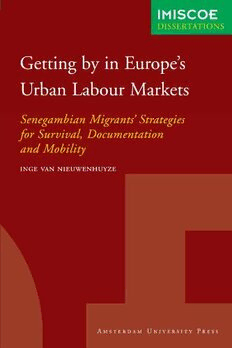
Getting by in Europe's Urban Labour Markets (IMISCOE Dissertations) PDF
240 Pages·2008·1.5 MB·English
Most books are stored in the elastic cloud where traffic is expensive. For this reason, we have a limit on daily download.
Preview Getting by in Europe's Urban Labour Markets (IMISCOE Dissertations)
Description:
This thesis examines two major social changes experienced by European cities in the last two decades: post-industrial economic restructuring and new immigration flows. The link between both has been extensively discussed throughout a variety of theoretical approaches and in numerous descriptive contributions. Adding to those studies, this research focuses on three elements of migratory experience that have been relatively neglected thus far: a dynamic view of changes over time, the influence of national welfare- and legislation frameworks, and the importance of support mechanisms outside the labour market. The material underpinning the arguments is the qualitative life-course analysis of 81 in-depth interviews with Senegambian migrants living in Antwerp and Barcelona. First, it is shown how a more dynamic approach on the position of newly arrived migrants in receiving economies improves the static perspective common to most theories. I describe how respondents may move from purely survival stages, over phases of looking for a regularisation of their legal status, to a more stable context in which they can work to improve their socio-economic situation. Second, the life course of these migrants is influenced by substantial differences between Antwerp and Barcelona in terms of labour markets, welfare and immigration policies. Despite the undeniable influences of globalisation, the local institutional framework and its implementation are crucial. In addition, immigrants interact with these rules, developing strategies to circumvent the law, limit the consequences of breaking it, or creatively trying to match conditions. Third, it is argued that a purely economic and individual approach cannot grasp the complexity, precariousness, and volatility typical of contemporary migratory experiences. In analysing their life courses, attention is paid to the changing roles of community, social support systems, the legal context
See more
The list of books you might like
Most books are stored in the elastic cloud where traffic is expensive. For this reason, we have a limit on daily download.
